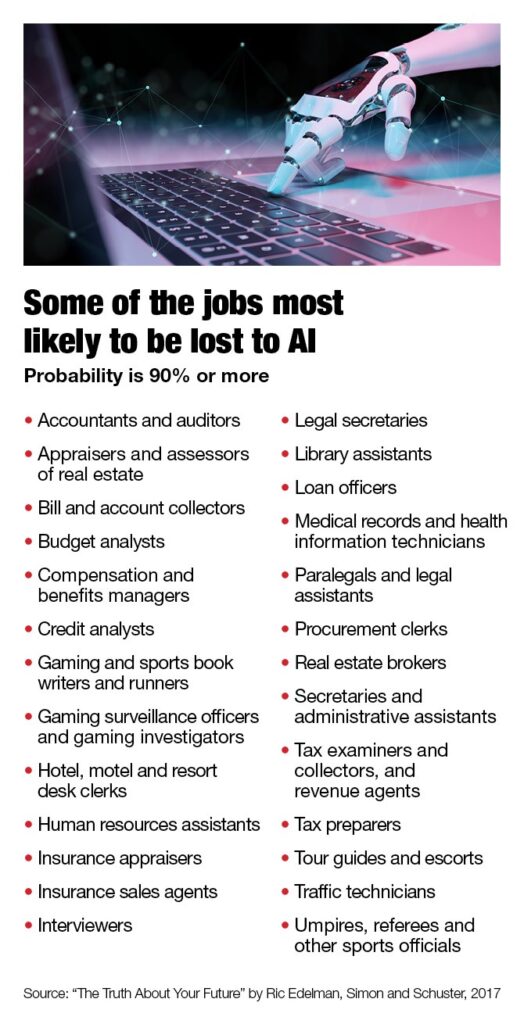

If this story doesn’t scare you, nothing will.
The other day, I told ChatGPT, the new generative AI technology created by OpenAI, to write a script for my daily podcast in my style. The software completed the assignment in less than one minute.
[Opinion: News and technology]
I then went to Eleven Labs and uploaded the text, along with a few clips of my prior podcasts; all that took two minutes.
Eleven Labs instantly created an audio file of the script, performed in my voice. It cost me $5. Listen to the podcast. My own staff were fooled — including my producer, who’s been with me for 30 years. Only my wife knew “something was up” — and even she needed 30 seconds to raise her eyebrow.
If those who know me best couldn’t tell that a machine had written and performed my podcast, how could a casual listener know? Think about this the next time you hear an audio clip featuring a corporate CEO. Or the president. Or your boss.
Consider the implications for your practice. Why should a client ask you something when they can just ask ChatGPT, Siri or Alexa? University of Florida finance professor Alejandro Lopez-Lira says the tech can predict stock prices. How much longer will you be better than machines — and what does this mean for your career?
If you’re an advisor nearing retirement, this should accelerate your departure from the industry. But what if you’re a young or mid-career advisor? If you operate a large firm, what does this mean for your organization’s sustainability?
Fortunately, there’s opportunity for excitement. The rise of AI — which I predicted in my book, "The Truth About Your Future" — doesn’t have to mean that you’re about to be obsolete. Rather, this latest tech could become your most productive business builder.
You can use generative AI to do your job faster and easier, with better results. An advisor at my old firm told me that when Silicon Valley Bank was collapsing, they told ChatGPT to write an email to a client explaining what happened — and to write it “in the style of Ric Edelman.” The advisor was not only able to produce and send an email faster than otherwise possible, the email was better written and, being in a style the client is familiar with and presumably enjoys, it delivered better results than if the advisor had tried to write it themselves.
Need to send an email to a client about GRATs? ChatGPT will produce it for you in moments. Want to know the price of Tesla on March 4, 2019? You’ll have the information instantly. You now have the greatest opportunity to boost your productivity since the invention of the internet.
Most importantly, ChatGPT won’t eliminate your clients’ need for you. Sure, they can ask ChatGPT, instead of you, about GRATs and Tesla’s price. But there are three reasons they won’t. They’d have to know what questions to ask, they’d have to take the time to ask them and they’d have to know how to analyze and evaluate the answers.
ChatGPT is thus no more of a threat to advisors than discount brokers were when they debuted in the 1970s. At the time, brokers everywhere lamented that the competition would put them out of business. Of course, that didn’t happen. What did happen was that the job of advisors shifted. Instead of being the providers of information, advisors became the providers of recommendations about that information. Advisors have become more indispensable than ever.
ChatGPT therefore gives advisors the opportunity to become more valuable to clients than ever. That’s because the tech gives clients access to more information than ever — and the more data clients are presented with, the more they’ll wonder what to do. That’s ChatGPT’s biggest weakness: It doesn’t know anything about the person who’s asking the questions.
ChatGPT knows nothing about your client’s income, expenses, assets or debts — let alone their relationships, family circumstances, risk tolerance, goals and objectives. That void makes the tech unable to offer advice — and that’s where you come in. Sure, ChatGPT or its successors might one day have that capability, but that is still years (or decades) away. In the meantime, the software only has access to a database that was compiled in 2021. It doesn’t even have access to the internet.
But generative AI is advancing at an exponential rate – that’s why you must learn how to use it. Otherwise, it will eventually replace you.
It will also take over the jobs held by your clients. A study from MIT found that grant writers, data analysts and HR professionals who used ChatGPT produced news releases, reports and emails 37% faster with superior results. Microsoft says ChatGPT cut the time it took to program a web server by more than 50%.

Many occupations thus face obsolescence (see sidebar). That’s not news; automation has been destroying jobs for centuries. What's new, though, is the speed at which this is occurring.
Innovations used to occur over generations. Your grandfather worked on a farm, your father worked in a factory, and you work in an office. Today, though, innovation is annual, not generational. Also, past innovations eliminated unskilled jobs. Buttons in elevators eliminated the need for elevator operators; there's no milkman making morning deliveries to your house anymore. And have you ever heard of a knocker-upper? You'd hire one to tap on your window with a pole or to shoot peas at the glass to wake you up. That occupation disappeared when the mechanical alarm clock was invented in 1847.
Generative AI doesn’t threaten dishwashers or car mechanics because it can’t do their jobs. But it can do the jobs of highly paid, college educated professionals — mathematicians, interpreters, web designers and journalists, for example. A study by the University of Pennsylvania says 20% of all workers could see at least half of their jobs affected. Some will have all their jobs done by AI. After all, why should an employer pay your client $100,000 a year to do what tech can do faster, cheaper and better — tech that never calls in sick or has a hangover, never sexually harasses anyone, doesn't demand unionization, and doesn't need training or supervision?
You won’t lose your job today. But your job will change. If you're smart, you’ll start now to learn how you can use this tech to improve your practice — increasing your productivity and the quality of advice and service you deliver to your clients. You’ll also help your clients learn how to embrace generative AI so they can protect their jobs, and thus their future financial security.
If you’re not willing to embrace generative AI, it’s time to start working on your retirement.
[More: The AI revolution is here]
Ric Edelman is founder of the Digital Assets Council of Financial Professionals.

Rajesh Markan earlier this year pleaded guilty to one count of criminal fraud related to his sale of fake investments to 10 clients totaling $2.9 million.

From building trust to steering through emotions and responding to client challenges, new advisors need human skills to shape the future of the advice industry.

"The outcome is correct, but it's disappointing that FINRA had ample opportunity to investigate the merits of clients' allegations in these claims, including the testimony in the three investor arbitrations with hearings," Jeff Erez, a plaintiff's attorney representing a large portion of the Stifel clients, said.

Chair also praised the passage of stablecoin legislation this week.

Maridea Wealth Management's deal in Chicago, Illinois is its first after securing a strategic investment in April.
Orion's Tom Wilson on delivering coordinated, high-touch service in a world where returns alone no longer set you apart.
Barely a decade old, registered index-linked annuities have quickly surged in popularity, thanks to their unique blend of protection and growth potential—an appealing option for investors looking to chart a steadier course through today's choppy market waters, says Myles Lambert, Brighthouse Financial.
